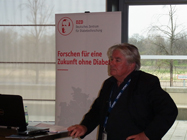Diabetes in research and the clinic was a major theme at this year’s Symposium of the German Society of Endocrinology (DGE). Prof. Stefan Bornstein, a renowned endocrinologist at Dresden University Hospital, attaches special importance to this topic. As a successful partner in the German Center for Diabetes Research (DZD), last year he and his team led by Dr. Barbara Ludwig achieved a spectacular scientific breakthrough: As a world first, they transferred an artificial pancreas system based on a human donor organ into a patient with type 1 diabetes. At the symposium Ludwig presented the next steps: Given the glaring lack of human pancreas as donor organs, the Dresden scientists want to advance the field of xenotransplantation. The organs come from pigs. The artificial pancreas the scientists developed is an ideal basis for this, since in this system the donor cells remain separated from the body of the receiver. This eliminates the need for immunosuppression, which is accompanied by adverse side effects.
From the laboratory to the clinic
The presentations of the DZD experts spanned a thematically broad spectrum from the labor atory to the clinic. The DZD board members Prof. Michael Roden, German Diabetes Center (DDZ) (photo, above left), and Prof. Hans-Ulrich Häring, University Hospital Tübingen (photo, right), together with Prof. Stephan Herzig, German Cancer Research Center (DKFZ) presented “News about Type 2 Diabetes from Basic Research” in a symposium on the opening day of the conference. Roden spoke about a possible inheritance of diabetes risk and the related genetic mechanisms. Together with other DZD scientists, he was involved in the discovery of some of the more than 70 known genes associated with type 2 diabetes. Herzig demonstrated on the basis of results of some of his recent studies the complexity of the intervention of glucose and insulin in the regulation of metabolism. Häring showed targets for completely novel diabetes therapies, which have come to light due to an increasing understanding of the role of the brain in diabetes and research on the central role of the liver in metabolism. Häring drew attention to the promising results of a DZD study on humans, which showed how fatty liver might successfully be treated with drugs. This paper was recently published in the journal “Lancet Diabetes & Endocrinology”.
atory to the clinic. The DZD board members Prof. Michael Roden, German Diabetes Center (DDZ) (photo, above left), and Prof. Hans-Ulrich Häring, University Hospital Tübingen (photo, right), together with Prof. Stephan Herzig, German Cancer Research Center (DKFZ) presented “News about Type 2 Diabetes from Basic Research” in a symposium on the opening day of the conference. Roden spoke about a possible inheritance of diabetes risk and the related genetic mechanisms. Together with other DZD scientists, he was involved in the discovery of some of the more than 70 known genes associated with type 2 diabetes. Herzig demonstrated on the basis of results of some of his recent studies the complexity of the intervention of glucose and insulin in the regulation of metabolism. Häring showed targets for completely novel diabetes therapies, which have come to light due to an increasing understanding of the role of the brain in diabetes and research on the central role of the liver in metabolism. Häring drew attention to the promising results of a DZD study on humans, which showed how fatty liver might successfully be treated with drugs. This paper was recently published in the journal “Lancet Diabetes & Endocrinology”.
Function of individual genes
Prof. Martin Hrabĕ de Angelis of Helmholtz Zentrum München, also a board member of the DZD, stressed in his “Vision Talk” the importance of the mouse as study object for diabetes. Through Hrabĕ de Angelis, the DZD participates in international consortia such as EUCOMM and IMPC, which seek to investigate the function of individual genes in the development and progression of diabetes with the aid of mouse models. In his talk Hrabĕ de Angelis also emphasized the importance of understanding the association between study results in the mouse and human disease: “The mouse is thus a valuable model in the development of new diabetes drugs.”
The interested questions and intensive discussions following these talks illustrated the importance of new approaches in diabetes therapy generated by successful research. DZD clinicians and basic researchers collaborate closely to achieve this goal. This interdisciplinary environment offers great conditions for the development of individualized prevention strategies and tailored, causal therapies. The DZD consists of five partners: Helmholtz Zentrum München, the German Institute of Human Nutrition Potsdam-Rehbrücke, the German Diabetes Center in Düsseldorf and the Universities of Tübingen and Dresden, which have joined together under the motto “Joint research for a future without diabetes”.
